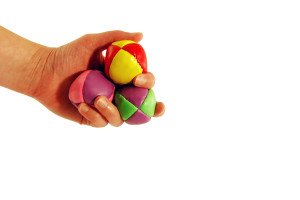 Even Fox News has joined the popular “liberal” press to warn of the dangers of multitasking. (See its 12 Reasons to Stop Multitasking Now.)
Even Fox News has joined the popular “liberal” press to warn of the dangers of multitasking. (See its 12 Reasons to Stop Multitasking Now.)
Yet, knowing the downside of multitasking and stopping the behavior are two different things, especially in the workplace. Multitasking still runs rampant in organizations.
Many of us feel pressured to juggle as much as we can, especially with high expectations from our boss and team members, rationed resources and peer pressure from other colleagues.
In many organizations, people like to brag on how busy they are and how multitasking is the best way to allegedly accomplish more in less time.
The status quo will continue until we intentionally take action and learn to “uni-task” instead of multi-task. Just being told that multitasking is bad isn’t enough to change our behavior.
Here are three ways to start uni-tasking.
1. Understand the brain science. Know that the executive function of your brain, the prefrontal cortex, is designed for serial processing—that is, doing one complex task at a time. When you think you’re multitasking, you’re actually quickly shifting your attention between complex tasks. This “dual-task interference” hurts performance by slowing you down, diffusing your focus and increasing your chances of making mistakes. You’re also adding to your stress.
(By contrast, the older “inner brain” that forms your unconscious—the brain stem, amygdala, basal ganglia—processes exponentially more information faster than the cortex. It’s always working in the background and can help you think better if you let it. See How to make your office as productive as your shower. The habits you’ve developed also allow you to do different levels of activities at the same time, such as drive and talk to a passenger or do pushups while listening to a recorded webinar.)
2. Make it easy to uni-task. Adjust your work environment to make it easier to focus on just one complex task at a time. Here’s what this can look like:
- For meetings: Hold shorter meetings, such as 15 to 20 minute standing meetings. This discourages you and others from using your laptops and other devices. (It’s hard to discretely check your phone when you’re standing with your peers.)
- For conference calls: Start the call by asking that people turn off their devices and screens (unless it’s a webinar). Plus make the format of the calls more interactive. If you and others know you’ll be called on to participate, you’ll be less likely to work on other projects during the meeting.
- Electronic distractions: Turn off your email during periods of the day when you need to focus on getting work done. Or, consider installing a special computer program that will keep you off of email and certain websites (think Facebook, Twitter, ESPN and others) for specific time periods.
- Other: Set a timer for 20 to 30 minutes during which you’ll work only on one project. Once the timer goes off, take a break and then resume other work. (This is basically how the Pomodoro Technique works.) Or, go to conference room or another room to work in peace and quiet without interruptions.
3. Recognize yourself for successfully becoming a uni-tasker. Celebrate your successes early and often. For example, as soon as you remember to uni-task, acknowledge yourself. (Say “I’m awesome!”, pump your fist or do something that makes you feel good.) And continue noting your abilities to remember to uni-task.
Also, start to identify yourself as a “uni-tasker”—someone who works smart, not just hard. And recognize others who are uni-tasking too. By self-identifying as a uni-tasker and celebrating, you’re cuing the reward system in the brain and releasing dopamine, the “feel good” hormone. The brain will start rewiring to make uni-tasking a regular action, and over time, a habit.
What about those other folks who are content to ignore science and continue to multitask? Ignore their boasts about their bad brain behavior. You now know better.
And if you want to crow about your improved focus, performance and results, be my guest. You’ll also improve your brain health, as I’ve learned in my applied neuroscience classes.
Are you ready to join me and becoming a uni-tasker?

0 Comments